Good Reason
It's okay to be wrong. It's not okay to stay wrong.
Category: religion (page 20 of 36)
It’s not a new idea that people construct their god based on whoever they are. Nice people, nice god. Horrible people, horrible god. Homophobic people, homophobic god. The god of the Hebrews was obsessed with details about animal sacrifice. The Christian god is obsessed with the sexual behaviour of other people. What else do you need to be convinced that gods are a creation of their people?
But even if you’d already cottoned on to this idea, it’s still exciting to see it verified experimentally.
For many religious people, the popular question “What would Jesus do?” is essentially the same as “What would I do?” That’s the message from an intriguing and controversial new study by Nicholas Epley from the University of Chicago. Through a combination of surveys, psychological manipulation and brain-scanning, he has found that when religious Americans try to infer the will of God, they mainly draw on their own personal beliefs.
…
Religion provides a moral compass for many people around the world, colouring their views on everything from martyrdom to abortion to homosexuality. But Epley’s research calls the worth of this counsel into question, for it suggests that inferring the will of God sets the moral compass to whatever direction we ourselves are facing. He says, “Intuiting God’s beliefs on important issues may not produce an independent guide, but may instead serve as an echo chamber to validate and justify one’s own beliefs.”
When people changed their opinions, they thought god changed his opinions, too.
In another study, Epley got people to manipulate themselves. He asked 59 people to write and perform a speech about the death penalty, which either matched their own beliefs or argued against them. The task shifted people’s attitudes towards the position in their speech, either strengthening or moderating their original views. And as in the other experiments, their shifting attitudes coincided with altered estimates of God’s attitudes (but not those of other people).
And finally, they used fMRI to detect any differences in brain activity when considering their opinion and god’s opinion. The difference being ‘none’.
The takeaway: people get themselves and their god mixed up. You’d think it would be a warning sign when your god agrees with you all the time. Maybe they just think they’re really ‘in tune’.
In Australia, some of the schools are run by religious organisations, like the Anglican Church. It’s not the best situation — for many students it involves going to religious services, which is the opposite of education. Apparently, going to mass can be quite boring. But these schools are a part of the system, and they do a good job.
The problem is that these schools get tax money from the government. Say, what’s to stop them from taking some of that money — paid by tax payers, intended for educating kids — and funneling it to the Anglican Church? Apparently nothing, because that’s just what happened in Perth.
Private schools have kicked in thousands of dollars to help bail out the Anglican Perth diocese after it was hit by the global economic crisis.
The school-backed bailout comes in the face of a crackdown on the use of government grants by Education Minister Liz Constable, who said she would be concerned if grants were not spent on running schools.
Mirrabooka’s John Septimus Roe Anglican Community School, which relies on taxpayers for about 70 per cent of its funding, emerged as the biggest contributor after Perth Anglican Archbishop Roger Herft appealed for help to run his diocesan council.
Archdiocese records show the school gave $30,000 to the appeal, double the $15,000 contribution from wealthy Christ Church Grammar School in Claremont.
The high-fee St Mary’s Anglican Girls School in Karrinyup chipped in $12,500 and All Saints College in Bull Creek $10,000.
But Hale School in Wembley Downs refused to hand over school funds to the diocese council, branding the move inappropriate.
At this stage, it’s not clear how much of the money came from taxes and how much came from fees paid by parents. Either way, it’s an outrage. That money was intended to educate kids, and instead it’s being shoveled into the coffers of the Anglican Church to keep it afloat.
This is why it’s a bad idea to have religions run schools. When public funds are involved, with no accountability, it’s inevitable that the parent organisation will put some pressure on the schools during hard times. The schools need to open their books and show where the money’s going. And if it’s going to some church and not to the kids, they need to be defunded or turned into a public school. We need more good public schools.
Is it wrong to pay attention to Sarah Palin? Some people have the idea that if we ignore her, it’ll starve her of oxygen and she’ll disappear. Well, with her new book out, she’s getting the oxygen whether we pay attention or not. So I think it’s best to confront La Palin directly, unpleasant though it be.
The quote that got my attention was this:
— On her belief in creationism and how she debated McCain manager Steve Schmidt about it: “But your dad’s a science teacher,” Schmidt objected. “Yes.” “Then you know that science proves evolution,” added Schmidt. “Parts of evolution,” I said. “But I believe that God created us and also that He can create an evolutionary process that allows species to change and adapt.” Schmidt winced and raised his eyebrows. In the dim light, his sunglasses shifted atop his hear. I had just dared to mention the C-word: creationism. But I felt I was on solid factual ground.
But she’s not.
What she’s describing is theistic evolution, which is sort of like splitting the difference between science and religion. It’s now the philosophy of choice for believers who can no longer ignore the torrents of evidence for evolution, but who don’t like its inevitably atheistic implications. So they acknowledge that evolution is true, but then they say “But surely a god must have been involved somewhere. Maybe he invented evolution! Yeah, that’s it.”
Okay. So besides cowardice, what’s wrong with theistic evolution? Two things:
Lack of evidence. Is there any evidence that a god exists and made evolution? No? Well, all righty then.
That doesn’t stop believers from dreaming him up anyway, and explaining the lack of evidence by saying that he wants to hide himself because
– he wants us to live by faith
– we don’t seek after him earnestly enough, and
– he’s shy.
Funny thing about that — that’s the same explanation I use for the apparent lack of evidence for subterranean mountain goats on Venus. They’re there, I tells ya! but we never see them because scientists refuse to look for them in earnest. Plus the mountain goats hide when we turn our telescopes toward them. How do they know when our telescopes are trained on them? They’re omniscient.
Hmm. Seems like the only way you can have a decent conspiracy theory is by crediting someone with omniscience.
The lack of evidence leads us to point number 2:
Occam’s pesky Razor. This general (and very useful) principle states that there’s no reason to accept a more complex explanation when a simpler one will do. Evolution explains biological complexity and similarity between animals just fine all by itself. You could slap a god on top of it (and a walrus, and a monkey, and fries to go), but this doesn’t really do a better job of explaining things than evolution all by itself, so Occam’s Razor says we lose nothing by cutting it out.
Trying to throw a god into the mix really misses the point of evolution: the process isn’t directed by anyone. If a god were in charge of evolution, it would be the most cruel and unfeeling being imaginable. How many millions of beings had to suffer and die from disease so that our bodies could evolve an immune system? How many had to eat each other so they could evolve sharp vision, long fangs, thick skin, fast legs, good brains, poisons, spikes, or any of the hundreds of other methods they use to survive? Saying a god set up this wasteful and savage system means that he’s sent untold billions of souls to the meat grinder, when he could have magicked up an Eden that was perfect to start with.
That reminds me: How do the theistic evolutionists reconcile evolution with Eden? Not very well, I’m afraid. But that’s another story.
Have a listen to the first minute of these YouTube clips.
You’ve seen this one with Tom the Scientologist…
and here’s one with Will the Scientologist.
They’re not new, but I’d never watched them back to back before. Now I’m struck by the similarity between them. No, I don’t mean how embarrassing it is to watch these two idiots blabbering while normal people can only stare in horrified fascination (especially that Scientologists are better qualified to help an accident victim than, say, a paramedic, or that 2 + 2 = 4 only if we agree that it does). And I don’t mean how they both repeat inflated claims made by their church about human potential.
These two share a discourse style that I’ve never seen before. It’s a weird kind of unfocused rambling, but with evangelical intensity. Acronyms appear out of nowhere (KFC?). They start sentences with no idea how to finish them, but they do it with certainty and weird bravado. It makes no sense, but they seem unaware that they’re making no sense.
Is this a style of monologue that they picked up at the Celebrity Centre? because I don’t want any of what they’re having.
Today, I’m proud of my state, which made a tentative step toward marriage equality, or should I say all-but-marriage equality. By passing R-71, Washington became the first state to allow something like gay marriage by a vote of the people.
I wish I could be as proud of Eastern Washington, which rejected R-71 county for county.


That said, can someone explain to me why the hell we’re allowing issues of civil rights to be decided by vote at all? If it were up to a vote, African-Americans still wouldn’t have civil rights. The courts were able to enact immensely unpopular civil rights rulings against popular opinion in the 60’s, and they did so because it was the right thing to do.
You just don’t put people’s rights to a vote. Should we have a vote over whether Latinos can own houses? Should people of Middle-Eastern descent be able to get plane tickets? Should left-handed people be allowed to drive? True, none of those things are ‘rights’ enshrined in the US Constitution, but denying them by law involves unequal treatment under the law. And I’ll bet that churches and other political organisations could spend enough money to raise doubts and fears in a credulous populace, just as they have with recent anti-gay legislation.
Eventually the tide will turn. I just hope that the haters can one day feel ashamed for their actions and opinions. And in the meantime, these kinds of votes should not be happening.
Dear Sister has sent me another email. It’s a series of images of Jesus; everything from meek-and-mild Jesus praying in the garden, to a modern and distinctly muscular Jesus rolling the stone away from the tomb his own damn self.
But at the end of the email, there’s a rather pointless broadside:
I’m not ashamed.
He is the only one that can save this country and they want him removed from the government.
Our great nation will not stand if we delete HIM from all aspects of our government as the atheists want
Now I don’t know how much of this stuff she believes (or if she just thinks it’s ‘interesting’), but when she sends a message to thirty of my family members telling them that atheists are essentially out to destroy the country, you bet I’m going to respond.
So this is what I sent back.
=-=-=-=-=-=-=-=-=-=
If you want to find out what atheists want, you should ask an atheist.
Hi. I’m an atheist. I can’t speak for all atheists, but I’m going to be presumptutous and try it anyway, based on my thoughts and my conversations with other atheists.
First off, there’s this thing in the U.S. Constitution called the ‘Establihment Clause’. It says:
Congress shall make no law respecting an establishment of religion, or prohibiting the free exercise thereof
That means that you can practice whatever religion you want (including no religion), but the government isn’t allowed to promote one religion over another.
We atheists think that the Founders meant that. They had every opportunity to write religion into the Constitution, and they chose not to. It’s not about removing Jesus from the government — the guy was never there in the first place.
Another thing. We atheists have noticed that lots of Christians are on the more conservative side, and lots of conservatives think the government isn’t very good at doing things. So we wonder why you want the government to handle the teaching of religion, instead of having churches doing it like usual. And which version of Christianity would the government be promoting? There are a lot of Catholics, but I don’t imagine that Protestants would be thrilled to have the government promote Catholicism. But which Protestant variety? Would Methodists get shut out, or would Baptists? How would Mormons feel to have some other religion get pushed by the government? Of all the sects and creeds that exist, do you really think that you’d be lucky enough to have the government promote your specific variety? We think you probably haven’t really thought this through.
We atheists wonder how exactly you think Jesus will save the nation. Perhaps wearing a cape and tights? We know about Christianity — many of us have been Christians — and we’ve noticed that you folks don’t act any better than we do, and often a good deal worse. So we don’t see exactly why it would be a good thing to make the government more Jesusy. Don’t get us wrong, you’re a lovely bunch of people, but we’ve noticed that your religion has a tendency to make people act in ways that are homophobic, sexually repressed, authoritarian, anti-intellectual, anti-science, anti-education, paranoid, fantasy-prone, and in some cases just plain crazy. Also a lot of you have an unhealthy fascination with other people’s sex lives. And the fact that people like that want control of the government scares the bejabbers out of us.
Finally, we don’t want to delete, erase, or outlaw your beliefs. You can go ahead and express your religious faith however you want in your homes, families, and church groups. After all, we don’t like people telling us what to believe any more than you do, which is why we don’t send out missionaries.
But does Jesus (if he’s still out there) really need all of you to email and legislate on his behalf? You may not be ashamed of him, but you sure don’t seem to have much confidence in his ability to look after himself.
Dear Sister has sent me this email again, so she must be trying to convey something. It’s one of those glurgy stories where the wily student turns the tables on the Atheist Professor.
Aah, the college professor. I don’t know why people love to bash on them. Maybe they got bad grades in college. Or possibly they had their faith challenged by someone smart and it frightened them. Now they’re hostile to Book Larnin’. Or perhaps there’s this malaise among some religious people, like science is making great strides in understanding the world and the universe, and they’re just stuck there in church like every other week, sucking in the vacuity. They understand that science and reason is in opposition to their god (which is why they warn each other to be cautious about it), but they can’t figure out what to do about it, and it’s frustrating. They could take on the problem, but that might be hard. It’s so much easier to forward an email instead.
Goodness knows this is all I ever do in class — argue with students about god — especially because we aren’t busy doing any actual course material. I’ve got free time to burn, which is why I often take the opportunity to belittle my students about their religious beliefs. And they love it — it’s why they worship lecturers like gods, and immediately take on their slightest opinions.
The actual email is very long and boring, so I’m putting it below the jump, with my comments.
Subject: Science vs God…Very interesting
Long, but lively and stimulating:) & WONDERFUL
Science vs God…Very interesting“Let me explain the problem science has with Jesus Christ.” The atheist professor of philosophy pauses before his class and then asks one of his new students to stand.
I start every lecture this way, except I’m plunging a dagger into a teddy bear. But I’m always very careful to make sure there are no Marines in my class. One time I challenged a god to knock me over. It didn’t go well.
“You’re a Christian, aren’t you, son?”
Yes sir,” the student says.“So you believe in God?”
“Absolutely.”“Is God good?”
“Sure! God’s good.”“Is God all-powerful? Can God do anything?”
“Yes.”“Are you good or evil?”
“The Bible says I’m evil.”
Imagine that your holiest book, what you consider to be the source of all divine knowledge, tells you you’re evil. That’s quite the head trip.
The professor grins knowingly. “Aha! The Bible!” He considers for a moment.
“Here’s one for you. Let’s say there’s a sick person over here and you can cure him. You can do it. Would you help him? Would you try?”
“Yes sir, I would.”
“So you’re good…!”
“I wouldn’t say that.”
“But why not say that? You’d help a sick and maimed person if you could.
Most of us would if we could. But God doesn’t..”
The student does not answer, so the professor continues. “He doesn’t, does he? My brother was a Christian who died of cancer, even though he prayed to Jesus to heal him. How is this Jesus good? Hmmm? Can you answer that one?”The student remains silent.
“No, you can’t, can you?” the professor says. He takes a sip of water from a glass on his desk to give the student time to relax.
No, he can’t, can he? Ability implies responsibility. Any of us would help, because we’re good moral beings. But the god of the apologists fails to do so because it would somehow render our existence meaningless, or something.
“Let’s start again, young fella, is God good?”
“Er…yes,” the student says.“Is Satan good?”
The student doesn’t hesitate on this one. “No.”“Then where does Satan come from?”
The student : “From…God…”“That’s right. God made Satan, didn’t he? Tell me, son. Is there evil in this world?”
“Yes, sir.”“Evil’s everywhere, isn’t it? And God did make everything, correct?”
“Yes.”“So who created evil?” The professor continued, “If God created everything, then God created evil, since evil exists, and according to the principle that our works define who we are, then God is evil.”
Without allowing the student to answer, the professor continues: “Is there sickness? Immorality? Hatred? Ugliness? All these terrible things, do they exist in this world?”
The student: “Yes.”“So who created them?”
The student does not answer again, so the professor repeats his question. “Who created them? There is still no answer. Suddenly the lecturer breaks away to pace in front of the classroom. The class is mesmerized.
I’m mesmerised myself, but then what do I know? I thought that theodicy meant ‘theological idiocy’. Actually, maybe I’m not far wrong.
“Tell me,” he continues onto another student. “Do you believe in Jesus Christ, son?”
The student’s voice is confident: “Yes, professor, I do.”The old man stops pacing. “Science says you have five senses you use to identify and observe the world around you. Have you ever seen Jesus?”
“No sir. I’ve never seen Him”“Then tell us if you’ve ever heard your Jesus?”
“No, sir, I have not.”“Have you ever actually felt your Jesus, tasted your Jesus or smelt your Jesus? Have you ever had any sensory perception of Jesus Christ, or God for that matter?”
“No, sir, I’m afraid I haven’t.”
Never smelt your Jesus? What kind of Christian are you? Or is that some kind of bizarre euphemism?
“Yet you still believe in him?”
“Yes.”“According to the rules of empirical, testable, demonstrable protocol, science says your God doesn’t exist. What do you say to that, son?”
“Nothing,” the student replies. “I only have my faith.”“Yes, faith,” the professor repeats. “And that is the problem science has with God.
There is no evidence, only faith.”
So far, so good.
The student stands quietly for a moment, before asking a question of his own.
“Professor, is there such thing as heat?”
“Yes,” the professor replies. “There’s heat.”“And is there such a thing as cold? asked the student.
“Yes, son, there’s cold too.”“No sir, there isn’t.”
The professor turns to face the student, obviously interested. The room suddenly becomes very quiet.
The student begins to explain.“You can have lots of heat, even more heat, super-heat, mega-heat, unlimited heat, white heat, a little heat or no heat, but we don’t have anything called ‘cold’. We can hit up to 458 degrees below zero, which is no heat, but we can’t go any further after that. There is no such thing as cold; otherwise we would be able to go colder than the lowest -458 degrees. Everybody or object is susceptible to study when it has or transmits energy, and heat is what makes a body or matter have or transmit energy. Absolute zero (-458 F) is the total absence of heat. You see, sir, cold is only a word we use to describe the absence of heat. We cannot measure cold. Heat we can measure in thermal units because heat is energy. Cold is not the opposite of heat, sir, just the absence of it.”
Silence across the room. A pen drops somewhere in the classroom, sounding like a hammer.
Why do they always write the professor like he’s a dumbass? I knew this one and I’m in linguistics, for criminy. (And just for the record, absolute zero is −459.67° F, but it’s hard to remember the details in a debate.)
“What about darkness, professor. Is there such a thing as darkness?”
“Yes,” the professor replies without hesitation. “What is night if it isn’t darkness?”“You’re wrong again, sir. Darkness is not something; it is the absence of something. You can have low light, normal light, bright light, flashing light, but if you have no light constantly you have nothing and it’s called darkness, isn’t it? That’s the meaning we use to define the word. In reality, darkness isn’t. If it were, you would be able to make darkness darker, wouldn’t you?”
So what? He’s a professor of philosophy, not physics — cut him some slack.
The professor begins to smile at the student in front of him. This will be a good semester. “So what point are you making, young man?”
“Yes, professor. My point is, your philosophical premise is flawed to start with, and so your conclusion must also be flawed.” The professor’s face cannot hide his surprise this time. “Flawed? Can you explain how?”
“You are working on the premise of duality,” the student explains.. “You argue that there is life and then there’s death; a good God and a bad God. You are viewing the concept of God as something finite, something we can measure. Sir, science can’t even explain a thought.
And religion can? If anything is going to explain thought, it’ll be neuroscience and not revelation.
It uses electricity and magnetism, but has never seen, much less fully understood either one.. To view death as the opposite of life is to be ignorant of the fact that death cannot exist as a substantive thing. Death is not the opposite of life, just the absence of it.”
He’s a monist? Would many Christians agree with this? I thought Satan was necessary to keep the heat off of god for doing all those rotten things. As in “Oh, it’s not god’s fault. It’s his patsy, Satan.” Maybe a Christadelphian wrote this.
Just so I don’t lose track, let’s keep a list of things that do not exist:
Cold
Darkness
Evil
Death
Notice also that, since the previous student admitted that he was evil, he technically doesn’t exist.
“Now tell me, professor. Do you teach your students that they evolved from a monkey?”
“If you are referring to the natural evolutionary process, young man, yes, of course I do”
Of course he does. We’ve already established that he’s obnoxious and evil. Why wouldn’t he be pro-evolution?
“Have you ever observed evolution with your own eyes, sir?”
The professor begins to shake his head, still smiling, as he realizes where the argument is going. A very good semester, indeed.
Yes, you can observe evolution with your own eyes. Evolution has been observed in the lab.
“Since no one has ever observed the process of evolution at work and cannot even prove that this process is an on-going endeavor, are you not teaching your opinion, sir? Are you now not a just scientist, but a also a preacher?”
No.
The class is in uproar. The student remains silent until the commotion has subsided.
“To continue the point you were making earlier to the other student, let me give you an example of what I mean.”
The student looks around the room. “Is there anyone in the class who has ever seen the professor’s brain?”
The class breaks out into laughter.“Is there anyone here who has ever heard the professor’s brain, felt the professor’s brain, touched or smelled the professor’s brain? No one appears to have done so. So, according to the established rules of empirical, stable, demonstrable protocol, science says that you have no brain, with all due respect, sir. So if science says you have no brain, how can we trust your lectures, sir?”
Now the room is silent. The professor just stares at the student, his face unreadable.
Finally, after what seems an eternity, the old man answers. “I guess you’ll have to take them on faith.”
Now the story has reached the pinnacle of dumbth. Which is not a thing; it is merely the absence of smartness.
If you’re not sure if there’s a brain in your head, I can reassure you: it’s very likely that you do. It’s not something you have to take on faith.
a. If you dissect a cadaver, you will observe a brain inside. You can repeat this experiment as many times as you like, for as many cadavers as you can find. We can then generalise to other humans, thus: humans have brains.
b. We can infer the existence of your brain by observing your behaviours. You can talk, breathe, move, and see. These are things that brains do. We know this because when people’s brains are damaged, they stop doing these things.
c. Some kinds of brain surgery have to be done when the patient is awake. If you have this kind of surgery, you can see your brain with the help of a couple of mirrors.
d. If you’re really not sure, come see me and I’ll get the band saw for some old school trepanation. I can guarantee that it won’t kill you because (as we’ve seen) death doesn’t exist. It’s just a word we use to describe your soon-to-be absence of life.
I’ve noticed a pattern when arguing with Christians. Their reliance on evidence is really selective. If you make a point, it’ll take extraordinary evidence for them to believe it. You could bring them all the evidence you like, and they still probably won’t believe you — as long as it’s something they don’t want to believe. But when they want to believe something, then they can be convinced by the merest hint of a possibility that it might be true. In fact, all they need to do is find out that an alternative belief might have a slight gap in it, and it sends them scampering back to whatever they want to believe, where it’s safe.
“Now, you accept that there is faith, and, in fact, faith exists with life,” the student continues. “Now, sir, is there such a thing as evil?”
Now uncertain, the professor responds, “Of course, there is. We see it every day. It is in the daily example of man’s inhumanity to man. It is in the multitude of crime and violence everywhere in the world. These manifestations are nothing else but evil.”
To this the student replied, “Evil does not exist sir, or at least it does not exist unto itself. Evil is simply the absence of God. It is just like darkness and cold, a word that man has created to describe the absence of God.
Why isn’t God just a word that man has created to describe the absence of evil? Apparently it only works one way.
God did not create evil. Evil is the result of what happens when man does not have God’s love present in his heart. It’s like the cold that comes when there is no heat or the darkness that comes when there is no light.”
The professor sat down.
On a whoopie cushion.
Pass this on if you have faith.
In summary, no one has seen the professor’s brain, therefore everything has to be taken on faith, including evolution. Science is just as poor a way of thinking as faith is, which presupposes that faith isn’t a good way of thinking. Cold isn’t an actual thing, and therefore God’s off the hook for any evil happening around the place because apparently evil and death don’t exist, although God somehow does.
Clear?
© 2024 Good Reason
Theme by Anders Noren — Up ↑
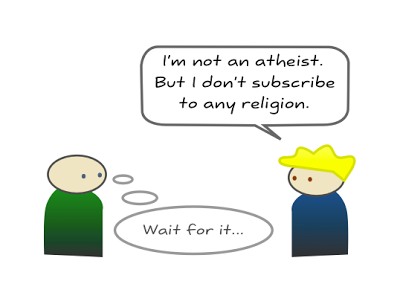

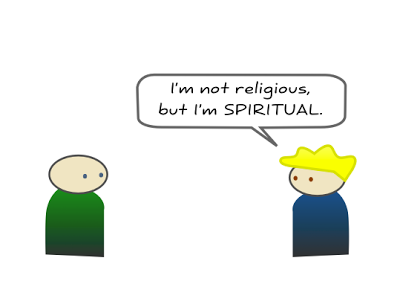



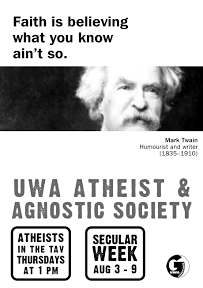

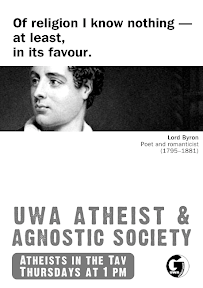

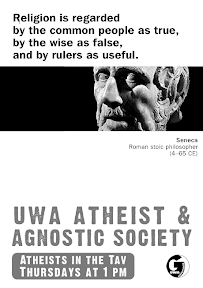
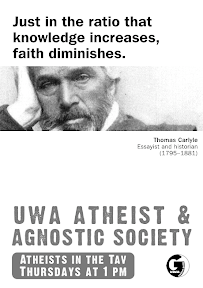

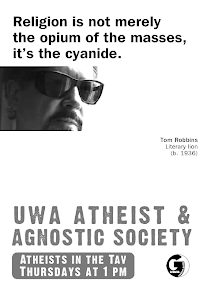
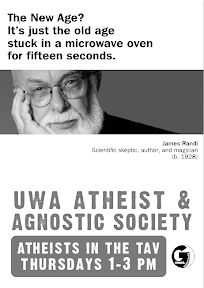


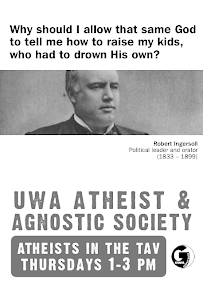

Recent Comments